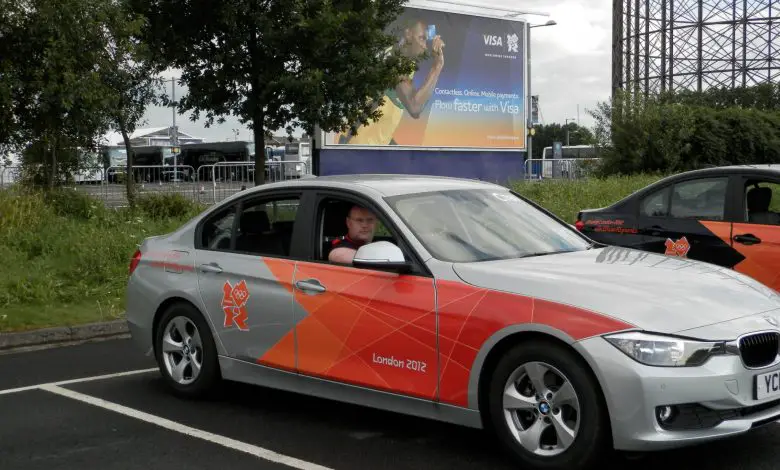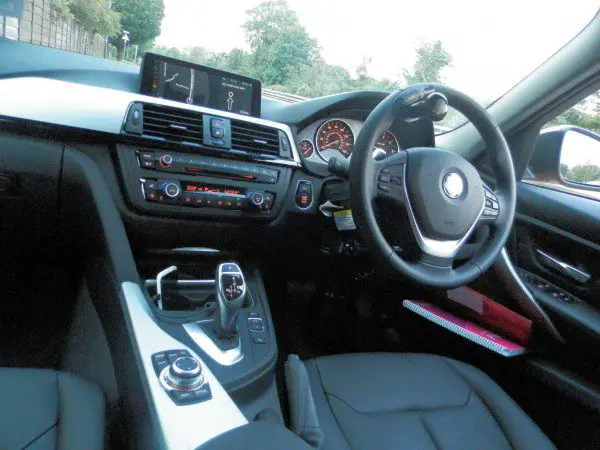
Games Makers: adapted driving for the Olympic Games
Disabled Motoring UK Trustee, Dan McIntyre, writes about his experience as a disabled volunteer driver during the 2012 London Olympic Games.
Let me take you back to 2010. I’m 33 and have been off work on long term sickness for over a year and am not expected to return anytime soon. I’m spending the majority of my time at home trying to figure out what to do… where to go from here.
Not long after, I spot an advert in Mobilise Magazine by LOCOG (London Organising Committee for the Olympic Games) looking for volunteer disabled drivers who could drive specially adapted BMW cars.
I applied for the position and, a few months later, I received an email inviting me to a selection event to be held at Salford Quays, in Manchester.
The selection event proved to be entertaining and informative, with the interview being very basic and conducted by another volunteer, which helped me relax and enjoy the conversation.
Fast forward a few more months (during which I take part in DMUK’s Alps Challenge, among other things) to October 2011, when I received an email telling me that I had been accepted as a Games Maker for the Olympics. I was amazed to have been selected; by that point over 250,000 people had applied and only 70,000 were selected. I was to be a T3 driver based at the Fleet Depot ExCel in London. Of course none of that meant anything to me at the time.
My first training session was in February 2012 and it was an orientation session held at Wembley Arena. Over the course of the weekend, there were four of these sessions with around 15,000 people attending each one. The session was hosted by Eddie Izzard and Sebastian Coe and provided an overview of what would be expected of us.
In May it was time for another training session, and this was a biggie as I would actually be getting my hands on the car I’d be driving. I was a bit nervous as we also had a driving instructor travelling.
At this session I found that the car I would be driving had only been imported to the UK, registered and adapted with an Alfred Bekker push/pull accelerator/brake and a steering knob the day before. I also met Graham Day, another DMUK member and wheelchair user with whom I was to share the car. Initially the car was issued with the call-sign Charlie Zero Nine Nine (but was later changed to Charlie Seven Eight Eight). The session was fun and by the end of the day both Graham and I were assessed as safe to drive, which was a relief.
Then came July and it was time to work our first shifts. Graham and I were given passes to allow us to bring our own cars right into the depot while we were on shift. The Army were providing security and I found the soldiers incredibly friendly and helpful, as well as rigorous. When arriving for one shift I was questioned about my catheter and asked to explain what it was and what it was used for. I struggled to keep a straight face as I explained its purpose, and the soldier turned a bright crimson before hurriedly thanking me and putting it back!
After all the hype and excitement that had built up over the past year or so, once on shift, it was a bit of a disappointment! My first three shifts (each ten hours long) passed with nothing to do. I ended up just cruising around London in a liveried BMW 3 series waiting for control to give me a job to do.
On my fourth shift I was stationed outside the Grosvenor House Hotel, on Park Lane in Mayfair, where the International Olympics Committee were having a meeting. I got my first passenger, a young gentleman who asked to be taken to the Hilton Hotel, Mayfair.
During that shift I needed to take a bathroom break and I had to ask radio control about toileting facilities. It took almost thirty minutes to get a response informing me I needed to go to the Intercontinental Hotel, about half a mile away. By the time I got that message I was in a lot of pain, but I managed to get my chair out and get into the hotel, where the staff proved to be extremely helpful.
My next three shifts passed with only one passenger on each shift, and for several hours during my eighth shift, a group of us were told we could go up into the main area of the ExCel centre and watch some of the events. I chose to watch the Fencing which I – surprisingly – enjoyed!
At the end of that shift I arrived back at my accommodation and sat there thinking about how quiet my job had been. LOCOG admitted that they had over anticipated demand for the transport service. There were a lot of us sitting around, either in the depot or out at venues or hotels, for hours at a time. I was bored began to feel homesick. I made the decision to go home. It wasn’t an easy decision to make, as I felt I was letting people down, not least of all myself, but I felt it was something I had to do.
Packing my gear and loading the car, I set off back up the motorway and was so relieved that night when I pulled onto my own driveway.
While I felt disappointed that I didn’t complete the sixteen shifts I’d been schedule to do, I did do half of them, which comes to some eighty plus hours, the equivalent of two working weeks. I did enjoy the experience and the chance to do some sightseeing and talk to lots of lovely people, both the other Games Makers and the public. I’m glad I took part and the memories will remain with me for a long time.
By Dan McIntyre
Check out…
• Paralympic Games 2012: We want you!!
• Oscar Pistorius: a historic night in pictures.
• Martyn Sibley: get me to the Olympic Games!


Dan, I was a T3 driver (“able bodied”) living in the London area, and felt just the same. Even though Locog admitted they had overestimated the driving requirement, I think they could have reacted in a more creative way. Drivers without a practical knowledge of London roads were at the mercy of the infamous DORS satnav – amazing that they were able to cope at all. Don’t feel you let anyone down – it was the other way round!
Kind regards, David.